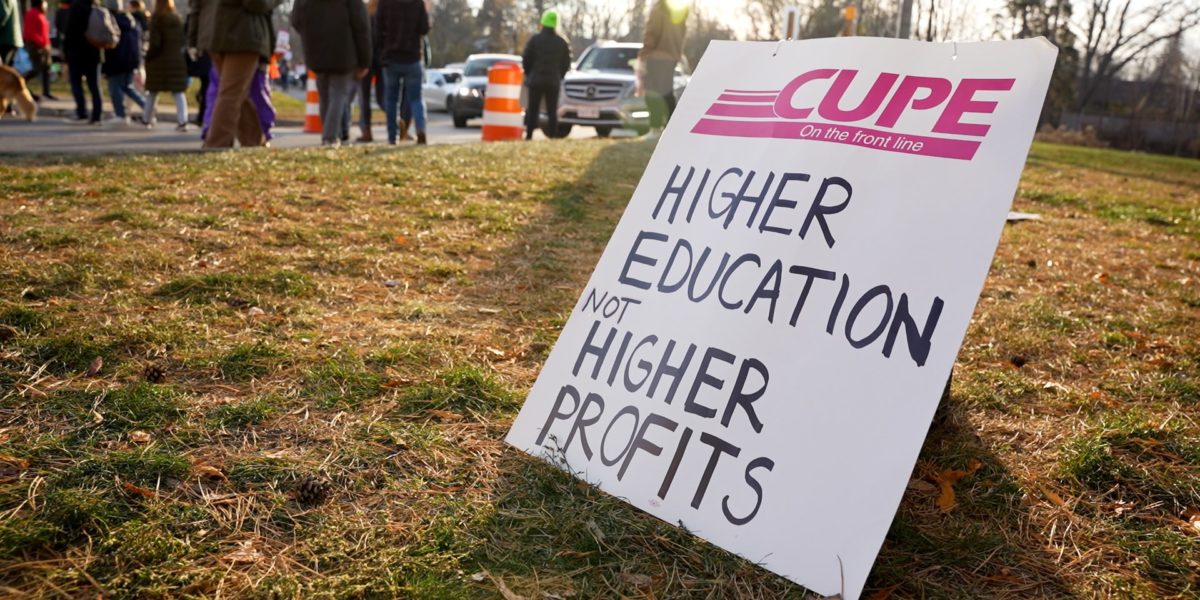Beneath the shadow of a looming strike, the Ontario government and the union representing Ontario education workers reached a tentative agreement that will begin its ratification vote on Thursday. Bargaining between the Canadian Union of Public Employee’s Ontario School Board Council of Unions (CUPE OSBCU) and the Progressive Conservatives has been tumultuous. Since CUPE OSBCU served notice to bargain in June, negotiations faced a slow start and were set back by the introduction of Bill 28, which strong-armed union members into a collective agreement.
After the repeal of Bill 28, bargaining resumed but CUPE OSBCU soon served a five-day strike notice. While Minister of Education Stephen Lecce said the strike notice was “disappointing,” the rocky bargaining journey may have been inevitable under previous anti-worker legislation that has been enacted by Doug Ford and the Progressive Conservatives.
An anti-worker attitude
“There are far less over the top ways that the government can flex its muscle that would be unlikely to galvanize the entire movement as we saw happen with Bill 28,” wrote Alison Braley-Rattai, Associate Professor in labour studies at Brock University, in an email to rabble.ca.
The government has flexed its muscles over workers for years before Bill 28. Ontario residents may remember when Doug Ford decided to postpone raising minimum wage to $15 an hour. Originally scheduled to increase in 2019, minimum wage in Ontario reached $15 an hour only in January of this year.
The progressive conservatives also lifted mask mandates in schools in February, despite organizations such as the Children’s Health Coalition imploring them to keep mandates until the situation with the Omicron variant of COVID-19 can be better assessed. Amidst a health human resource crisis, Doug Ford is looking to cut healthcare staffing costs, according to a report by Press Progress.
Doug Ford also introduced Bill 124 in 2019. This bill limits wage increases for public sector workers to one per cent per year. Even if the tentative agreement with CUPE OSBCU is ratified, tensions and unrest may continue as Bill 124 still shackles other public sector unions during bargaining.
Unions have the momentum
Professor Larry Savage, who is also a professor for the Labour Studies department at Brock University, said that the momentum gained while mobilizing against Bill 28 should continue.
“There’s no doubt the repeal of Bill 28 gave union members confidence that they could stand up, fight back, and win. But the test for unions going forward will be to translate that political victory into wins at the bargaining table,” Savage said.
Reaching these victories at the bargaining table may be difficult considering the government’s anti-worker attitude.
“OSBCU’s experience at the bargaining table did not appear to be a good one,” said Braley-Rattai. “The Education Minister started with divisive rhetoric early on in the negotiating process and did not strike a conciliatory tone until the announcement about the tentative agreement. I think other public sector unions particularly those in the education sector could not be blamed for going into their respective negotiations with their backs up.”
The Elementary Teachers Federation of Ontario (ETFO) served notice to bargain in June and their agreement expired at the end of August. As well, the Ontario Nurses Association’s hospital central agreement is set to expire in March 2023. ETFO has said in a joint statement with other educator organizations that free and fair bargaining is vital to a fair deal.
President of CUPE OSBCU, Laura Walton, said in a press conference that she does not like the tentative agreement. She said that the deal reached is the best agreement possible with a government that is unwilling to listen. The disappointment in the tentative agreement is palpable from CUPE OSBCU and could be forecasting disaster for other public sector unions preparing to bargain.
“Bargaining is rarely easy and it can always go madly off in all directions,” Braley Rattai said. “Whatever the reason for that, casting blame and attempting to sow division in the public as Minister Lecce did can’t but have a negative impact upon negotiations.”
Braley-Rattai said it is hard to predict whether more widespread job action can be expected in the future. However, she said it is clear that Ford was shown there are limits to how much he can push around organized workers.




